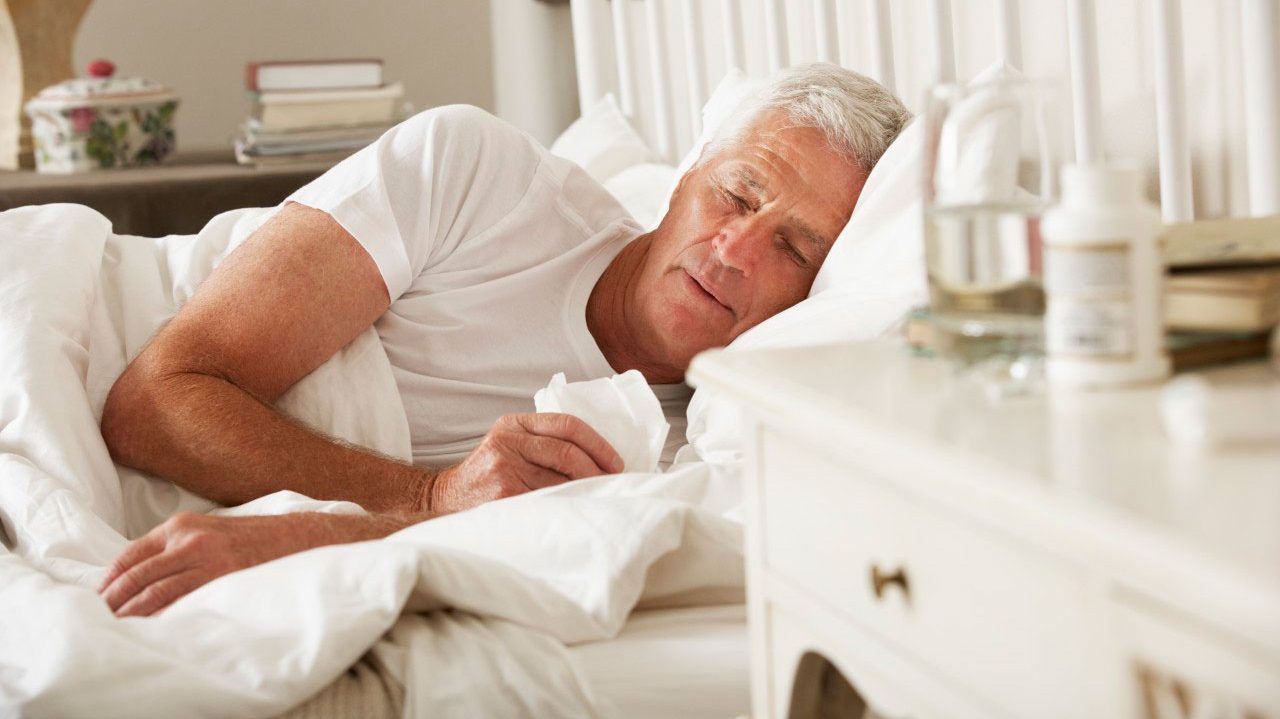The Best Way to Sleep with a Cold

What is the best way to sleep with a cold? Breathe easier and rest better with these bedtime cold relief tricks.
When you have a cold, your doctor will recommend that you get plenty of rest. Yet sleep doesn’t come easily when you’re preoccupied with a stopped-up nose and an annoying tickle in the back of your throat.
You can’t drift off until you control the congestion, sore throat, and other symptoms that are making you uncomfortable. Here are a few remedies to help you find the best way to sleep with a cold.
Drink a cup of tea with honey
Any warm liquid is soothing to the throat, but a spoonful of honey could calm your cough, too. Research done in children finds honey relieves coughs and helps children sleep even better than an over-the-counter cough suppressant. (You shouldn’t give honey to kids under 1, however.)
Turn on a cool mist humidifier
Bone-dry winter air parches the mucus membranes that are supposed to keep your nose and mouth moist, which can make an already irritated throat even scratchier. Turn on a cool-mist humidifier before bed to add moisture to the air while you sleep. “A humidifier is especially helpful for people with certain upper respiratory conditions,” says Shaila Pai-Verma, MD, an internist at Rush University Medical Center.
Spray saline
Some people find that a few spritzes of salt and water (saline) up the nose eases congestion. In children, saline nasal spray might also soothe a sore throat and cough. Saline is unlikely to cause any major side effects, so if it works, go ahead and use it.
Raise your pillow
Tip your pillow to elevate your head and neck while you sleep. This inclined position gives you a better angle to breathe through a stuffed nose.
Try vapor rub – with caution
For decades, parents have relied on a mixture of camphor, menthol, and eucalyptus oils before bedtime to help their sick children get to sleep. Does it work? A study in the journal Pediatrics found that vapor rub relieved children’s congestion and cough, and helped them sleep better than no treatment or plain petroleum jelly (it should be noted the study was funded by Procter and Gamble, maker of Vicks VapoRub). If vapor rub helps your child sleep, then use it – but do so with caution. Don’t rub it on children under two, and use it only on the neck and chest in kids under 6 years old. Never put vapor rub around a child’s nose or mouth, because the ingredients can be toxic when swallowed or absorbed into the mucus membranes.
Ditch decongestants
Decongestants work by shrinking inflamed blood vessels in the nose and opening up clogged nasal passages to help you breathe more easily. Yet these medicines can also make you jittery and interfere with your sleep. If your decongestant is keeping you awake, use it earlier in the day and stick to saline spray before bed.
Use caution with nighttime cold remedies
Products marketed to relieve nighttime cold symptoms and help you sleep more soundly work via a combination of ingredients. Usually they contain a pain reliever (acetaminophen), cough suppressant, and decongestant/antihistamine to relieve congestion and sneezing. The trouble with multi-symptom nighttime cold relievers is they can contain more ingredients than you need. And, some people find these drugs have the opposite effect than intended, contributing to wakefulness rather than sleepiness. Use caution when trying nighttime cold remedies, especially if you have high blood pressure or an underlying medical condition. You’re better off using individual cold medicines that target the specific symptoms you have. Don’t give any cold medicine to children under 4, and check with your pediatrician before giving them to older kids.
Make time for sleep
Not only will a good night’s sleep help you get over your current cold, but it could also help you avoid a future illness. A study by researchers at University of California, San Francisco, found people who sleep six hours a night or fewer are four times more likely to catch a cold when they’re exposed to a virus than those who sleep seven hours or more nightly. “It goes beyond feeling groggy or irritable,” said lead author Aric Prather, PhD, assistant professor of psychiatry at UCSF. “Not getting sleep fundamentally affects your physical health.”
Updated:
March 30, 2020
Reviewed By:
Janet O’Dell, RN